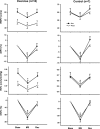Effects of aerobic exercise training on sympathetic and renal responses to mental stress in humans
- PMID: 19915172
- PMCID: PMC2806136
- DOI: 10.1152/ajpheart.00880.2009
Effects of aerobic exercise training on sympathetic and renal responses to mental stress in humans
Abstract
The effects of aerobic exercise training (ET) on muscle sympathetic nerve activity (MSNA) and renal vascular responses to mental stress (MS) have not been determined in humans. We hypothesized that aerobic ET would reduce MSNA and renal vasoconstriction during MS. MSNA, mean arterial pressure (MAP), heart rate, renal blood flow velocity (RBFV), and peak oxygen uptake (V(O2peak)) were recorded in 23 healthy adults. Fourteen subjects participated in 8 wk of aerobic ET, while nine subjects served as sedentary controls (Con). ET significantly increased V(O2peak) (Delta18 +/- 1%; P < 0.001) and decreased RBFV at rest (60 +/- 4 to 48 +/- 3 cm/s; P < 0.01), whereas Con did not alter V(O2peak) or RBFV. ET did not alter resting MSNA (11 +/- 1 to 9 +/- 1 bursts/min) or MAP (84 +/- 2 to 83 +/- 2 mmHg), and these findings were similar in the Con group. MS elicited similar increases in MSNA (approximately Delta2 bursts/min; P < 0.05), MAP (approximately Delta15 mmHg; P < 0.001), and heart rate (approximately Delta20 beats/min; P < 0.001) before and after ET, and the responses were not different between ET and Con. Likewise, MS elicited similar decreases in RBFV and renal vascular conductance before and after ET, and the responses were not different between ET and Con. Perceived stress levels during MS were similar before and after the 8-wk study in both ET and Con. In conclusion, ET does not alter MSNA and renal vascular responses to MS in healthy humans.
Figures



Similar articles
-
Sympathetic adaptations to one-legged training.J Appl Physiol (1985). 1999 May;86(5):1583-7. doi: 10.1152/jappl.1999.86.5.1583. J Appl Physiol (1985). 1999. PMID: 10233121 Clinical Trial.
-
Neurovascular responses to mental stress in the supine and upright postures.J Appl Physiol (1985). 2008 Apr;104(4):1129-36. doi: 10.1152/japplphysiol.01285.2007. Epub 2008 Jan 24. J Appl Physiol (1985). 2008. PMID: 18218909 Free PMC article.
-
Sympathetic neural responses to mental stress: responders, nonresponders and sex differences.Am J Physiol Heart Circ Physiol. 2009 Mar;296(3):H847-53. doi: 10.1152/ajpheart.01234.2008. Epub 2009 Jan 23. Am J Physiol Heart Circ Physiol. 2009. PMID: 19168718 Free PMC article.
-
Sympathetic vasoconstriction in skeletal muscle: modulatory effects of aging, exercise training, and sex.Appl Physiol Nutr Metab. 2021 Dec;46(12):1437-1447. doi: 10.1139/apnm-2021-0399. Epub 2021 Aug 4. Appl Physiol Nutr Metab. 2021. PMID: 34348066 Review.
-
Renal blood flow during exercise: understanding its measurement with Doppler ultrasound.J Appl Physiol (1985). 2023 Apr 1;134(4):1004-1010. doi: 10.1152/japplphysiol.00392.2022. Epub 2023 Mar 9. J Appl Physiol (1985). 2023. PMID: 36892892 Review.
Cited by
-
Greater Influence of Aerobic Fitness on Autonomic Support of Blood Pressure in Young Women Than in Older Women.Hypertension. 2020 Jun;75(6):1497-1504. doi: 10.1161/HYPERTENSIONAHA.119.14042. Epub 2020 Apr 27. Hypertension. 2020. PMID: 32336237 Free PMC article.
-
Forearm vascular responses to mental stress in healthy older adults.Physiol Rep. 2013 Dec 5;1(7):e00180. doi: 10.1002/phy2.180. eCollection 2013 Dec 1. Physiol Rep. 2013. PMID: 24744859 Free PMC article.
-
Using Free-Living Heart Rate Data as an Objective Method to Assess Physical Activity: A Scoping Review and Recommendations by the INTERLIVE-Network Targeting Consumer Wearables.Sports Med. 2025 Feb;55(2):275-300. doi: 10.1007/s40279-024-02159-1. Epub 2025 Feb 2. Sports Med. 2025. PMID: 39893599 Free PMC article.
-
Renal Denervation Update From the International Sympathetic Nervous System Summit: JACC State-of-the-Art Review.J Am Coll Cardiol. 2019 Jun 18;73(23):3006-3017. doi: 10.1016/j.jacc.2019.04.015. J Am Coll Cardiol. 2019. PMID: 31196459 Free PMC article. Review.
-
Impact of aerobic training on cardiovascular reactivity to and recovery from challenge.Psychosom Med. 2011 Feb-Mar;73(2):134-41. doi: 10.1097/PSY.0b013e31820a1174. Epub 2011 Jan 21. Psychosom Med. 2011. PMID: 21257979 Free PMC article. Clinical Trial.
References
-
- Blumenthal JA, Fredrikson M, Kuhn CM, Ulmer RL, Walsh-Riddle M, Appelbaum M. Aerobic exercise reduces levels of cardiovascular and sympathoadrenal responses to mental stress in subjects without prior evidence of myocardial ischemia. Am J Cardiol 65: 93–98, 1990 - PubMed
-
- Carter JR, Ray CA, Cooke WH. Vestibulosympathetic reflex during mental stress. J Appl Physiol 93: 1260–1264, 2002 - PubMed
-
- Claytor RP. Stress reactivity: hemodynamic adjustments in trained and untrained humans. Med Sci Sports Exerc 23: 873–881, 1991 - PubMed
-
- Cleroux J, Peronnet F, de Champlain J. Sympathetic indices during psychological and physical stimuli before and after training. Physiol Behav 35: 271–275, 1985 - PubMed
Publication types
MeSH terms
Grants and funding
LinkOut - more resources
Full Text Sources
Medical

